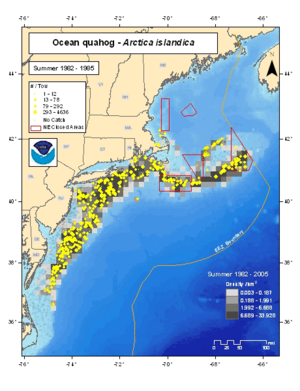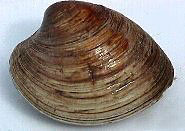Quahog: Difference between revisions
imported>Howard C. Berkowitz (New page: right|thumb|300px|Northeast Atlantic distribution '''Quahog''' is a clam species, ''Arctica islandica'', a mollusk commercially harvested on both coasts ...) |
imported>Howard C. Berkowitz No edit summary |
||
| Line 1: | Line 1: | ||
{{subpages}} | |||
[[Image:Sos quahog 8285.png|right|thumb|300px|Northeast Atlantic distribution]] | [[Image:Sos quahog 8285.png|right|thumb|300px|Northeast Atlantic distribution]] | ||
'''Quahog''' is a [[clam]] species, ''Arctica islandica'', a mollusk commercially harvested on both coasts of the North [[Atlantic Ocean]]. It is a slow-growing species, although not overfished; commercial fisheries are subject to [[Vessel Monitoring System]] tracking. While individuals over 200 years old have been found, growth slows after 20 years.<ref name=NOAA>{{citation | '''Quahog''' is a [[clam]] species, ''Arctica islandica'', a mollusk commercially harvested on both coasts of the North [[Atlantic Ocean]]. It is a slow-growing species, although not overfished; commercial fisheries are subject to [[Vessel Monitoring System]] tracking. While individuals over 200 years old have been found, growth slows after 20 years.<ref name=NOAA>{{citation | ||
Revision as of 18:08, 3 June 2009
Quahog is a clam species, Arctica islandica, a mollusk commercially harvested on both coasts of the North Atlantic Ocean. It is a slow-growing species, although not overfished; commercial fisheries are subject to Vessel Monitoring System tracking. While individuals over 200 years old have been found, growth slows after 20 years.[1] Even with the long history, the First Annual Cape Cod Quahog Day will take place in 2009.
In ocean waters, they are taken by dredging from the seafloor, although quahogs are also harvested by hand rakes in shallow coastal waters; the latter is a recreational fishery in New England.
Fresh quahogs have an excellent flavor, but freshness is essential unless they are promptly frozen. They will, however, keep well for a week after harvesting, but need to be rinsed in cold water, and then refrigerated and kept on their sides. Discard any that stay open; they are dead. They can be eaten raw on the half shell, but are unpleasantly tough when steamed or fried, they are used in a variety of clam dishes, but aficionados all have a special recipe for baked, stuffed quahog. Chopped, they work well in chowders, sauces, and clam cakes.
To speak of "opening" a quahog marks one as a novice, for whom the task will be a challenge. The proper term is "shucking". Traditionally, it is easiest to shuck a quahog when it has been chilled for several hours. While purists are shocked by the idea, very brief microwaving will also relax the muscle, although it may toughen it slightly. Unless one is very experienced, or enjoys cut hands, a specific clam knife is appropriate. Slide the blade along the inside of one shell, which will cut one side of the two adductor muscles. Open the shell and release the meat by cutting the other side.
References
- ↑ Larry Jacobson and James Weinberg (December 2006), Status of Fishery Resources off the Northeastern US: Ocean quahog (Arctica islandica), National Oceanographic and Atmospheric Administration

